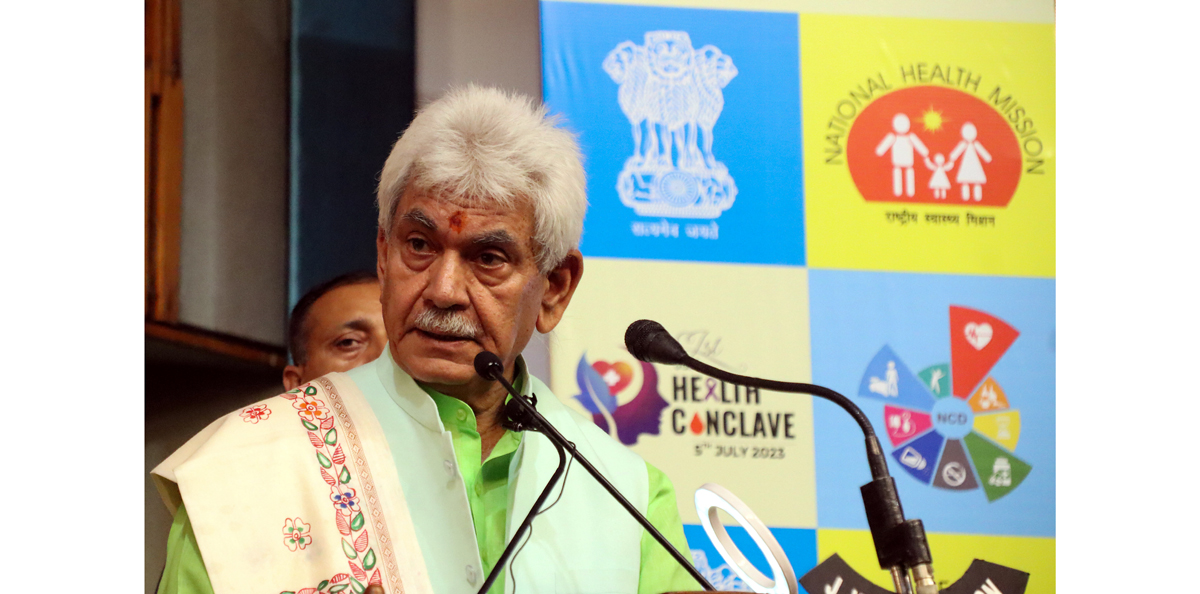
‘Post-COVID spurt in mental illness, drug addiction’
Fayaz Bukhari
SRINAGAR, July 5: Lieutenant Governor Manoj Sinha today said that health care has improved in last 3-4 years in Jammu and Kashmir due to massive infrastructural development in the sector.
The LG in his address to the Health Conclave held at SKICC today said that in the past three to four years, health care has changed a lot right from primary to district level.
“Patient care has improved and massive health care related infrastructure has been set up across the J&K. New technological tools have been introduced that saves time and helps the doctors ensure best possible treatment to the patients,” he said.
Sinha said post-COVID, the mental ailment and drug addiction related cases have shown a spurt. He, however, extended all-out support to the Health and Medical Education (H&ME) department and Institute of Mental Health and Neurosciences (IMHANS) for addressing both the issues effectively.
Click here to watch video
The LG said that as per the study done by the IMHANS, post-COVID-19 pandemic, mental ailments that include common mental disorders, severe mental disorders and drug addiction among youth has shown a surge. “The UT administration extends its full support to the H&ME, IMHANS and doctors to pull out the youth from anxiety and the vicious cycle of drug abuse,” he said.
Sinha urged the H&ME department to launch massive awareness campaigns at Pachayat levels about ways and means of preventing anxiety and fighting drug addiction. He said the introduction of Tele -Mental Assistance and Networking Across States (MANAS) in J&K’s Health Sector is going to help in a big way to fight various mental disorders.
“Today, IMHANS has signed a MoU with Tata Institute. We have got Tele MANAS and this will definitely help in a big way to counsel youth suffering from mental disorders including depression and anxiety,” the LG said.
Tele Mental Health Assistance and Networking Across States (Tele-MANAS) initiative has been launched by the Ministry of Health & Family Welfare during October 2022. It aims to provide free tele-mental health services all over the country round the clock, particularly catering to people in remote or under-served areas. There is a toll-free number available for round the clock counselling.
The LG said that there is a misconception among people that they can get every kind of facility in their areas. “We have started two new Cancer Institutes in Kashmir and Jammu where special treatment to the fatal disease will be provided. There will also be counselling for cancer prevention as well,” he added.
Sinha said at many hospitals, there is equipment but no manpower available to operate them. “This needs to be addressed,” he said.
He said post 2019, J&K got 7 Medical Colleges, two AIIMS, 8 nursing colleges, two cancer institutes and 2 bone and joint hospitals.
The LG advocated “structural changes” after thorough deliberations with the public and stakeholders in the Health and H&ME department. “It should not always be that an Assistant professor should become Professor and Principal. Let there be deliberations over the issue,” he said.
Sinha inaugurated 44 healthcare facilities worth Rs. 56.18 cr to strengthen the medical infrastructure.
He also rolled out and launched several new initiatives to strengthen health system resilience including T3- Test, Treat and Talk Anemia Camps, Non-Alcoholic Fatty Liver Disease Programme, and Scan and Share service for OPD registration. He also distributed the Volunteer Engagement certificates to ASHAs.
In order to improve community extension of health services, National Health Mission, Jammu and Kashmir is recruiting 380 Additional ASHAs and 31 ASHA Facilitators as approved by Government of India.
Furthermore, there are also 334 numbers of tribal ASHAs sanctioned for various districts of J&K meant to cater the health care needs of the tribal population in an attempt to improve the health indicators of the migratory population.
Rajeev Rai Bhatnagar, Advisor to Lt Governor; Dr Arun Kumar Mehta, Chief Secretary; Bhupinder Kumar, Secretary Health and Medical Education; Dr Roderico. H.Ofrin, WHO representative to India; Dr Pratima Murthy, Director NIMHANS; Dr RA Badwe, Director Tata Memorial Centre; Dr Ashish Gulia, Director Homi Bhabha Cancer Hospital & Research Centre; Prof. Parvaiz Ahmad Koul, Director SKIMS; Prof. Masood Tanvir, Principal GMC Srinagar; HoDs, medical experts and members from medical fraternity were present.

